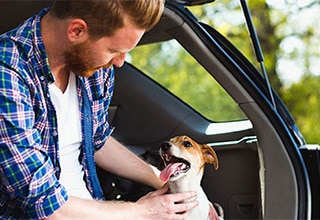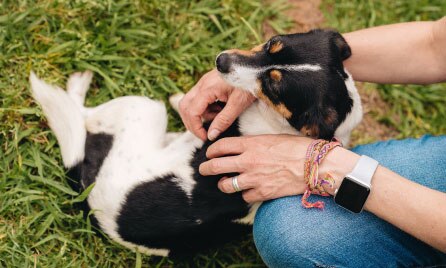- text
-
† Offer available to new Everyday Pet Insurance policyholders, and is limited to 1 membership per eligible policy. The free membership offer (valued at $199p.a) is from the date of your policy commencement, provided your Everyday Pet Insurance policy remains active. You are not eligible to redeem the free membership subscription for cash or credit. VetAssist is a separate subscription based service to the Everyday Pet Insurance product, and is provided independently by Everyday Insurance third party service provider, VetChat Services Pty Ltd (VetChat). Click here for full VetAssist Service terms and conditions. Everyday Insurance reserves the right to vary or remove this offer at any time and will provide reasonable notice of any such changes.
Taking care of your dog in summer.
There are some unique needs when it comes to dog care during the hotter months in Australia. Here are some things to consider:
Ticks.
One type of tick, the paralysis tick, is a big problem right along the East Coast of Australia. Commonly found during spring and summer in Sydney and surrounds, and all year round in the warmer areas up north, the paralysis tick can pose major health risks to our pets.
If a tick attaches to a pet, it begins to release a paralysis toxin as it feeds. This toxin may cause pets to become very sick, and when left untreated, can result in paralysis and death.
The good news is there are some effective, readily available options for tick prevention. For dogs, this includes preventative topical treatments, tablets and collars. If you live in a tick prone area, it is also recommended to do a daily 5 minute tick search on your dog with your finger tips - from the tip of their nose to their tail, and everywhere in between.
If you are concerned about ticks and your pet, chat to your Veterinarian immediately.
Tip: if heading to a new destination always call the local Veterinarian ahead of time to see what you need to watch out for in the area.
Staying cool.
Hot and humid weather can quickly result in heat stroke in dogs, however this is easily prevented.
On hot days, keep your dog inside with cooling on if possible; if not, make sure there is plenty of shade and shelter available. They need access to lots of cool fresh water to drink, and exercise is only appropriate in the very early morning or late evening when it is cooler. Remember dogs paws are sensitive to heat and can burn from walking on hot surfaces.
While dogs rely mainly on panting to cool off, lying on a cool surface or having air flow pass over their wet skin can help. If your dog is too hot, ensure they are out of direct heat, have a cool surface to lie on and have access to water; you can actively cool them using wet towels or a hose to dampen your pets’ skin and paws (room temperature water only - not cold), and turn on the fan or air conditioner so that air is moving over their skin.
If your pet is showing signs of heat related distress (such as heavy panting, drooling, appearing confused or unsteady) they need to head straight to your local Vet - ensure the air conditioner is on in the car, as you make your way to the clinic.
Tip: Don’t leave the wet towel as a cover on your dog - this will trap the heat and prevent cooling.
Keeping hydrated.
Cooling off is thirsty work - dogs need easy access to cool or room temperature water to drink at all times. Dogs will need to drink more water on hot days than on cooler days, so ensure that multiple large water bowls are available and that they are kept out of the direct sun.
Sunburn and skin protection.
Although dogs are not as susceptible to sunburn as us; they can and do get sunburnt. Skin pigment and fur do afford some natural protection, but where there is no pigment, sparse hair and exposure to sun - the area is susceptible to burn. Particular areas of concern are the nose, ears and tummy.
Keep your pet out of the direct sun (particularly 10am-4pm) and provide shade or shelter. When prolonged sun exposure is unavoidable - consider a sunscreen that is safe and made for dogs.
Learning to swim.
Contrary to popular belief - not all dogs know how to swim, although most can learn!
Start by gently exposing them to games in shallow water where they can stand, rewarding behaviour, and then when they are confident at that water depth, gradually increase the depth until they are actually swimming.
Gentle exposure lessens the chance of anxiety or negative associations with water.
Find the cover that’s right for you.
Related articles.
- text
-
Everyday Pet Insurance policies entered into for the first time prior to 17 July 2023 and subsequent renewals of those policies are issued by The Hollard Insurance Company Pty Ltd ABN 78 090 584 473, AFSL 241436 (Hollard), arranged and administered by PetSure (Australia) Pty Ltd ABN 95 075 949 923, AFSL 420183 (PetSure) and promoted and distributed by Hollard’s Authorised Representative (AR) Woolworths Group Limited ABN 88 000 014 675, AR 245476 (Woolworths). Everyday Pet Insurance policies entered into for the first time on or after 17 July 2023 and subsequent renewals of those policies are issued by PetSure and promoted and distributed by PetSure’s AR, Woolworths. Any advice provided is general only and does not take into account your individual objectives, financial situation or needs. Please consider the Product Disclosure Statement (PDS) to ensure this product meets your needs before purchasing, or choosing to continue with the product. PDS and Target Market Determination available at insurance.everyday.com.au/pet-insurance.





